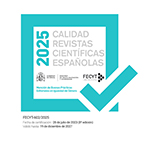Understanding the Lack of Science on Tv: Network Decision-Makers’ Opinions towards Televisual Science
Resumen
La falta de ciencia en la televisión española puede ser explicada mediante las personas responsables de la producción, programación y oferta de contenidos televisivos. Dos grupos focales formados cada uno por cinco personas responsables de tomar decisiones sobre dichos aspectos en cadenas televisivas permitieron identificar sus opiniones: la ciencia en la televisión es necesaria, la función de la ciencia televisiva es educar a la audiencia, las cadenas públicas son las responsables de mostrar contenidos científicos, el gobierno debería obligar a programar contenidos científicos, la ciencia en la televisión contribuye a aumentar el nivel cultural de la audiencia, y las personas que ocupan puestos de poder no están interesadas en mejorar el nivel de alfabetización de la sociedad. Posteriormente, la generalidad de esas opiniones se observó mediante un cuestionario aplicado a 450 personas con cargos directivos de televisión. Un análisis estadístico de perfil latente mostró que las características individuales de los profesionales (i.e., el género, la edad, el nivel educativo) no influyen en la formación de esas opiniones, pero sí influyen los aspectos relacionados con el desempeño profesional (i.e., el área de cobertura, la titularidad de la televisión).
Descargas
Descarga artículo
Licencia
La revista Estudios sobre el Mensaje Periodístico, para fomentar el intercambio global del conocimiento, facilita el acceso sin restricciones a sus contenidos desde el momento de su publicación en la presente edición electrónica, y por eso es una revista de acceso abierto. Los originales publicados en esta revista son propiedad de la Universidad Complutense de Madrid y es obligatorio citar su procedencia en cualquier reproducción total o parcial. Todos los contenidos se distribuyen bajo una licencia de uso y distribución Creative Commons Reconocimiento 4.0 (CC BY 4.0). Esta circunstancia ha de hacerse constar expresamente de esta forma cuando sea necesario. Puede consultar la versión informativa y el texto legal de la licencia.










